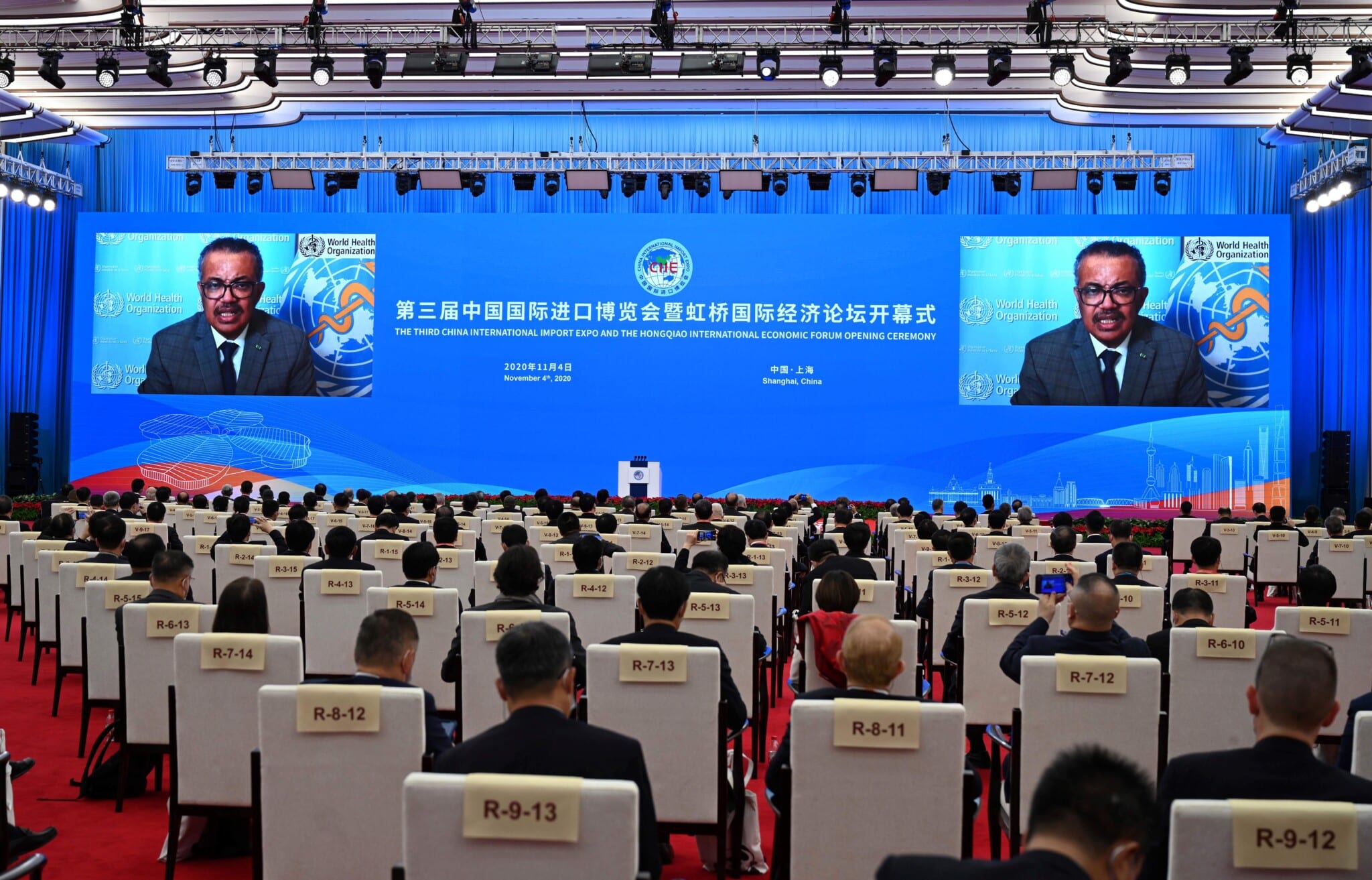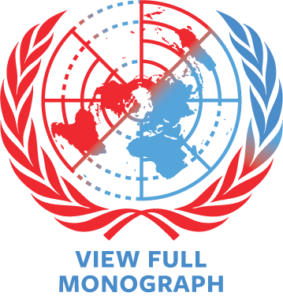June 30, 2021 | International Organizations Monograph
World Health Organization
June 30, 2021 | International Organizations Monograph
World Health Organization
Introduction
The World Health Organization (WHO), a UN specialized agency, was formed in 1948 with the principal objective of “the attainment by all peoples of the highest possible level of health.”1 The WHO’s mandate was originally focused on coordinating global health policy and conducting limited research. Its operations have expanded to account for many health-related challenges, including monitoring public health risks, managing responses to health emergencies, and organizing large-scale vaccination programs.2
Today, the WHO’s goals include achieving “triple billion” targets by 2023 – that is, 1 billion more people benefitting from universal health coverage, 1 billion more people better protected from health emergencies, and 1 billion more people enjoying better health and well-being.3
The WHO is supported by a biennium budget, which totaled $5.84 billion dollars in 2020–2021, a slight increase from its 2018–2019 budget of $5.62 billion dollars.4 The organization relies on financial contributions from member states (both assessed and voluntary) as well as from private donors, such as the Bill and Melinda Gates Foundation. The United States, the WHO’s top funder, contributed approximately $893 million during the 2018–2019 budget cycle, $237 million of which was assessed and $656 million of which was voluntary.5

WHO Director-General Tedros Adhanom Ghebreyesus delivers a speech via video in Shanghai, China, on November 4, 2020, for the opening ceremony of the 3rd China International Import Expo. (Photo by STR/AFP via Getty Images)
Problems
COVID-19 has exposed major weaknesses in the WHO’s pandemic surveillance system and raised important questions about China’s efforts to influence global health standards. Although all WHO member states are signatories to the binding 2005 International Health Regulations (IHR),6 the WHO and United Nations have no legal means to enforce the IHR.7 This enforcement gap includes the IHR’s requirement that WHO member states report public health emergencies of international concern in a “timely manner.” The WHO also remains wholly reliant on member states to provide data and access to WHO investigators following an outbreak within their borders, even if those same member states are perceived as “obstructing the response.”8
The flaws in the WHO’s response to COVID-19 have been compounded by numerous structural, governance, and prioritization deficiencies, many of which have persisted for decades. Central to the WHO’s challenges are its vague mandate and ever-expanding list of priorities, rather than a more narrow focus on a select number of core functions, such as providing technical advice.
Following the WHO’s controversial responses to outbreaks of both SARS9 and Ebola,10 expert panels advocated for wholesale WHO reform, with a focus on improving organizational accountability and the WHO’s history of prioritizing political over technical considerations.11 The vast majority of these recommendations remain unrealized. In addition, leaked WHO documents have exposed wasteful spending, included revelations that the WHO spends more on travel than it does on programs to eradicate AIDS, tuberculosis, and malaria combined.12
The WHO’s swelling public health mandate has also left the organization increasingly dependent on voluntary contributions to maintain its operations, which, in turn, has increased the influence of individual countries over the WHO. Over the last seven years, voluntary contributions grew by 18 percent, from $3.9 billion in 2014–2015 to more than $4.7 billion in 2018–2019.13 For its part, China has used strategically timed voluntary donations to buttress Chinese President Xi Jinping’s geopolitical ambitions while portraying the United States as an unreliable funding partner,14 even though the United States contributes 10 times more to the WHO than China does.
Beyond China, the IHR’s governance gaps have also been weaponized by Syrian dictator Bashar al-Assad in his war against Syrian civilians. Since 2013, for example, the WHO has spent millions of dollars on behalf of the Syrian Ministry of Defense to buy blood bags, transfusion equipment, and other medical equipment, even though the ministry prevents any of these supplies from reaching besieged civilians. 15 Instead, these WHO-subsidized items are often redirected to non-governmental organizations run by Assad’s family and friends,16 thereby relieving the regime of the burden of purchasing these items itself. Despite such conduct, the Syrian government won election in May 2021 to the WHO Executive Board, which steers the agency’s work.17
Lastly, the WHO’s annual meetings have maintained an agenda item to debate “health conditions in the occupied Palestinian territory, including east Jerusalem, and in the occupied Syrian Golan.” No agenda item exists for any country other than Israel. On May 26, 2021, the WHO devoted a full day of its eight-day annual session to this agenda item.18 During the session, delegations unfairly condemned Israel for violating the health rights of Palestinians as well as those of Syrians in the Golan Heights. 19 The WHO passed a resolution requiring its director-general to submit another report on this matter in 2022. The 2021 report makes no mention of Hamas or its role in instigating violent anti-Israel demonstrations and insinuates that Israel is responsible for Palestinian domestic violence. 20 While criticizing Israel is certainly fair, holding Israel to a different standard than the rest of the world meets the working definition of antisemitism adopted by the International Holocaust Remembrance Alliance (IHRA) and the U.S. State Department. 21
Recommendations
While the Trump administration in June 2020 announced plans to withdraw from the WHO,22 the Biden administration reversed that decision. Continued U.S. participation in the WHO could provide Washington with an important platform to advocate for improved global health standards, increased accountability for member states, and a more streamlined WHO portfolio in keeping with the organization’s original mandate – if both the administration and Congress are willing to forcefully leverage U.S. contributions to achieve reforms.
As a starting point, the United States should push the WHO to make the following reforms:
- Demand an independent UN investigation into the WHO’s and China’s COVID-19 responses. The WHO’s internal investigation into its own COVID-19 response,23 as well as investigative exposés,24 have uncovered damaging information regarding China’s efforts to conceal the extent of the outbreak at its onset. These investigations have raised serious questions about the WHO’s credibility and objectivity. Similar to the UN investigation into widespread fraud in the Iraq Oil-for-Food Program, the United Nations must establish a fully independent panel to investigate the WHO’s COVID-19 response as well as Beijing’s violations of its IHR obligations.
- Narrow the WHO’s mandate. The WHO was never intended to implement global health activities and has strayed too far from its original mandate.25 The WHO’s Constitution underscores its role in coordinating and promoting global health cooperation – not in overseeing its execution.26 The WHO should therefore aim to outsource certain functions to other responsible entities already leading the way in those fields, 27 thus allowing the WHO to focus on a smaller number of core functions wherein it maintains a comparative advantage.28 These efforts should include renegotiating key aspects of the IHR to improve accountability over rogue states, as well as streamlining the organization’s operations.
- Lead a coalition of like-minded WHO members in passing a resolution wherein the WHO formally adopts the IHRA’s working definition of antisemitism. This would enable the WHO to insist that standing agenda items solely focused on Israel violate the agency’s own policies and must be removed. If the agency does not adopt and implement the IHRA working definition, Congress should consider tying U.S. funding to the WHO to such adoption and implementation.
At its best, the WHO is a vehicle to promote global health standards. At its worst, it provides cover to regimes that disregard international norms. The world failed to reform the WHO after both SARS and Ebola. Repeating that mistake could have disastrous consequences for global health in the future.
